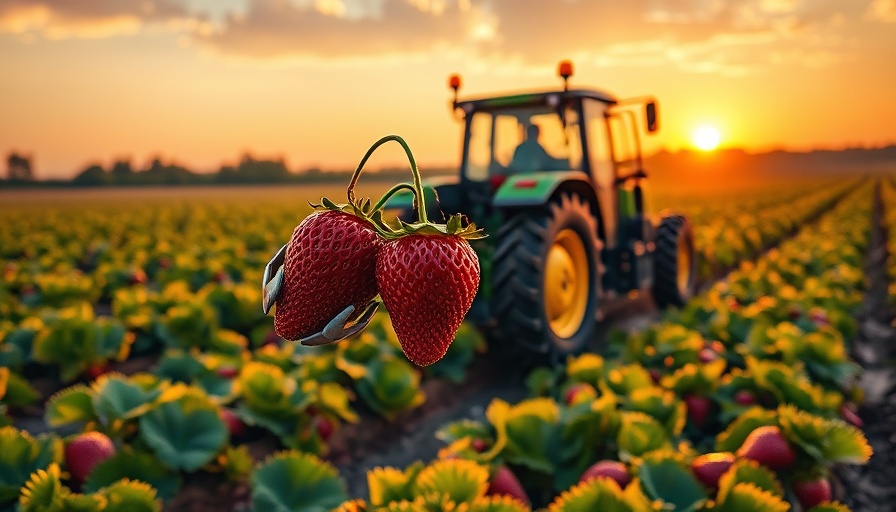
The AI Farming Revolution: Transforming Agriculture for a Sustainable Future
In the last few years, we have witnessed a remarkable shift in farming practices fueled by advanced technologies. As revealed in the video The AI Farming Revolution Is Here, the integration of AI, robotics, and data analytics is reshaping agriculture, making it more efficient, sustainable, and capable of feeding a growing global population. This transformation is not just a dream for the future; it's happening right now.
In The AI Farming Revolution Is Here, the discussion dives into how technology is transforming agriculture, exploring key insights that sparked deeper analysis on our end.
Historical Context: The Evolution of Farming
For millennia, farming was synonymous with tradition—soil cultivation, sweat, and the unyielding sun were the backbone of food production. However, as climate change, urbanization, and population growth challenge these age-old methods, the agricultural sector recognizes the need for innovation. The traditional practices of our ancestors, while foundational, may not sustain the demands of feeding 10 billion people by 2050. Hence, the farming revolution begins with technology, ushered in by precise data and analytics.
Precision Agriculture: The Backbone of Modern Farming
The cornerstone of this new agricultural model is precision agriculture, which utilizes advanced technologies to increase productivity and sustainability. According to the video, satellites from companies like Planet Labs are scanning millions of acres, gathering crucial data that helps farmers monitor plant health in real-time. Ground sensors track moisture and nutrient levels, ensuring crops receive exactly what they need. With AI platforms like those offered by John Deere, farmers can create a digital twin of their fields to make informed decisions about irrigation and fertilization, achieving a reported 30% reduction in water usage.
Autonomous Machines: Farming’s New Workforce
As we look at the technological advancements taking place within farming, autonomous machinery plays a vital role in this revolution. The John Deere autonomous tractor is a perfect example, operating around the clock and using GPS for high precision. This not only slashes fuel consumption by 15% but also helps maintain soil integrity by minimizing compaction. Robotics like the laser weeding bots represent the future of weeding—spotting issues without any need for harmful herbicides. This signifies a significant advancement in how we approach pest and weed control.
Drones: The Eyes in the Sky for Sustainable Farming
Emerging as powerful allies in sustainable agriculture, drones have transformed from mere observation tools into precision instruments capable of targeted interventions. As detailed in the video, these drones can spot spray sick plants, drastically cutting pesticide use by up to 95%. By applying just what is needed when it is needed, these technological advances help protect not only the crops but the ecosystems surrounding them.
The Impact: Growing More with Less
The implications of these innovations are profound. With data-driven decision-making, farmers are not only increasing yields but also reducing environmental impact. This revolution could double food production while minimizing detrimental effects on our environment, according to projections. The convergence of technological advancements in farming is exciting, and as consumers, we must advocate for these evolving practices that promise a healthier planet.
Future Predictions: Where Do We Go From Here?
As we look to the future of agriculture, the challenge lies not only in the technology itself but in how society adapts to it. The insights gleaned from the AI farming revolution highlight a trend toward broader adoption of sustainable practices. It's clear that our dependence on innovation will only grow stronger as we face challenges such as food security, climate change, and resource depletion. Those engaged with agriculture, be they farmers, technologists, or policymakers, must invest in continuous learning and collaboration to ensure that these advancements translate into practical benefits for everyone.
Call to Action: Engage in the Future of Farming
If the transformation of agriculture excites you, consider exploring local farms or organizations advocating for these innovations. Support initiatives aimed at integrating AI and sustainable practices to bolster our food systems. Stay informed, share your thoughts, and participate in discussions about the future of food production. Maybe you’ll discover how you can contribute to the movement, whether through advocacy or informed consumer choices.
 Add Row
Add Row  Add
Add 






Write A Comment